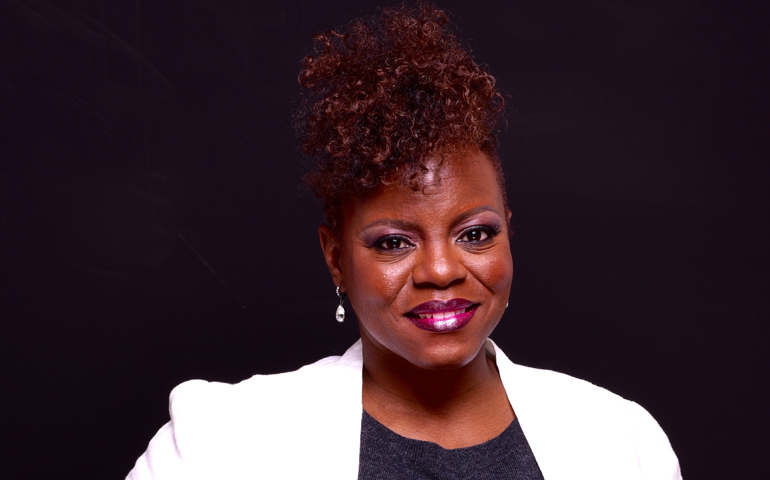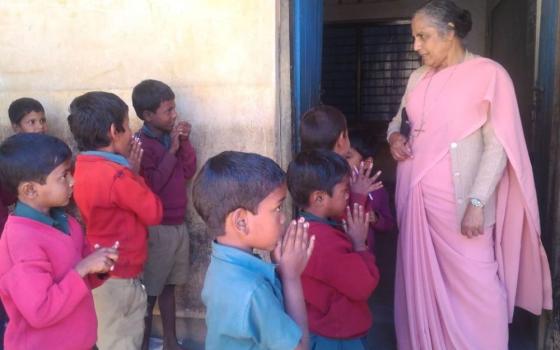
Angela Polite (D'Ambrose Boyd/dambroseboyd.com/photography)
Angela Polite had little awareness of the Blessed Mother when she was growing up in the African Methodist Episcopal tradition in South Carolina. Now, though, some three decades later, she is about to open off-Broadway in "Mary Speaks," a world premiere one-woman play — inspired by Holy Mary — that she has been developing over the last decade.
"We were not exactly in love with Mary as our Catholic brothers and sisters are," Polite said during a telephone interview with NCR. "I knew she was a young girl and pretty special. As I began to think of Mary more as a mother and modernize her voice, I started to fall in love with her."
Having Mary for inspiration isn't the only unexpected element in Polite's journey to Theatre for the New City in New York's East Village, where "Mary Speaks" runs from Feb. 16 through 26.
The "very proud native of Charleston and descendant of Gullah people" was a TV producer in Washington, D.C. She had been part of the drama club at school, played clarinet and sung in choirs but had never performed professionally until she took a sabbatical to study acting in England in 2004, which led to some television commercials and an uncredited part on the HBO drama "The Wire." Three years later she decided to "take the big leap" — quit her job, sell her car and move to New York to pursue acting.
Newly arrived in the city, she joined the First AME Bethel Church in Harlem. When the pastor, the Rev. Henry A. Belin III, learned she was an actress, he asked her to take part in the annual combined parishes Advent program, Caring and Sharing, for about 200 people. Even though she had never written a show and had little perception of Holy Mary, she decided to modernize the Mother of God as the prototype of all mothers who had struggled to keep their sons alive when their very existence was deemed a threat to society.
"I saw her as a regular mother," she said.
Although she has no children of her own, Polite kept that image of Mary in mind as she appeared in several off-Broadway plays, including "Outcry," in which she played the mother of Emmett Till, the 14-year-old African-American boy who was lynched in Mississippi in 1955 for reportedly flirting with a white woman.
"Outcry" was performed in 2012, the same year that controversy was swirling over the death of another African-American teen, Trayvon Martin, a 17-year-old youth fatally shot by a neighborhood watch coordinator for a gated community in Florida. Parallels were repeatedly made during audience talkbacks and Polite started thinking about how she wanted to respond as a performer. She pulled out her old work from the Advent program and began fashioning her play.
"It's been a big journey, a very big journey," she said.
In addition to her off-Broadway engagement, Polite has been invited to perform "Mary Speaks" on March 4 as part of the International Human Rights Festival at Dixon Place on the Lower East Side of Manhattan.
Polite set her "passion play" in Charleston so she could write authentically. It begins in the early 1900s when her Mary, an African-American of Gullah descent, is 13 and conceives and gives birth to a son after a spiritual encounter in the wilderness one night. It continues through the Jim Crow South until Mary is 46.
"I wanted to look at a timeline of African-American women and their sons," she said.
While her Mary is post-slavery, Mary's grandmother remembers those days well. Polite sees a connection between her character and the mother of Jesus, who was a Jewish girl and part of a special people, a group set aside.
Through narrative, monologues, music and dance she uses the life of the biblical Mary to create characters, black and white, to tell a story of black mothers and sons. Polite wrote the play's final song after the 2014 death of Eric Garner, the 43-year-old African-American man who died on Staten Island after a New York City Police Department officer placed him in a chokehold while arresting him. Her lyrics span the sorrows of the centuries:
A Saviour on a cross
A Man swinging on a tree
A Dead boy on the street.
She wrote several songs as she developed the play. "Telling a story in the African-American tradition, it would be unnatural not to have some music in it," she said.
The first reflects Mary's Magnificat:
I didn't choose this fate. I was picked from among the girls
Not yet touched and not yet opened to the bruises of this world.
Polite relates to that openness to God.
"She was a young, innocent girl with the level of faith to say 'let it be unto me as you will.' My life is guided by God in the things I do."
As she worked on the show, which runs 65 minutes, she sought advice from one of her ministers, a graduate of Union Theological Seminary who offered a "womanist perspective," and her pastor who counseled her on scriptural references.
"It was very important to me to keep the story along the timeline of Mary and for the writing to come from scripture," she said. "Mary only speaks four times in the Bible. I wanted to make sure I stayed true."
The final scene ties all grieving black mothers together with Holy Mary.
"It's quite overwhelming to me," Polite said, adding that pain and mourning are universal.
"I hope mothers grieving in South Africa, India, China and any race can feel the same pain as Mary felt. We connect it to the cross, to connect to the pain of others," she said. "I hope people understand that that's what we need to get back to.
"In the last year, politically and socially, there's been a danger that we stop looking at each other as human. It's been Republican, Democrat, black, white, millennials, baby boomers.
"I hope the audience will come away with the idea of remembering the humanity of us all and remembering we are one and should be one. We are here to witness the pain of others and to be open to it and have more peace in the world."
[Retta Blaney is an award-winning journalist and the author of Working on the Inside: The Spiritual Life Through the Eyes of Actors.]



